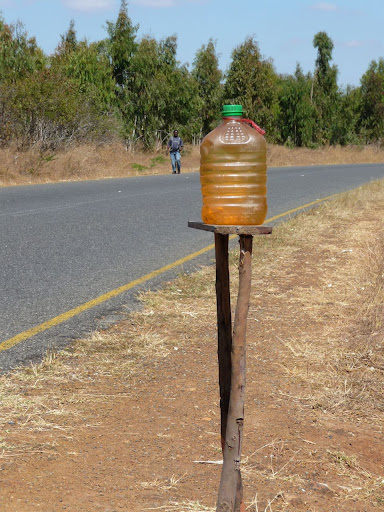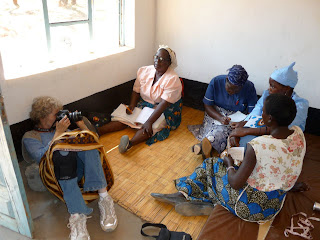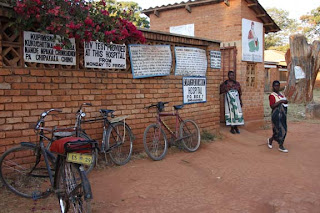29 June, Sunday
The driver from Embangweni showed up half an hour early—at 8:30 AM. Fortunately, I was packed. Eileen was almost ready but it threw us both a little into a tizzy. Anyway, we got everything in the cab of a Toyota pickup. There was room for four (including the driver, Wezi, which means Grace and is a name used by both men and women) and we picked up the hospital secretary and her 14-month old for the trip back.
Wezi had clearly planned to get diesel in Kasungu but when we got to the BP filling station, there was no diesel to be had. No diesel in either of the other two filling stations in town either. Red cans were placed in the lanes to show they were out.
About 5 minutes further north along the M1 we understood why. The diesel delivery truck was pulled over to the side of the road and the driver was changing a tire. Wezi's body language changed a bit after that. He said we didn't have enough diesel to get all the way to Embangweni. But not to worry, if we got stuck, they could send some diesel out from the mission station (still about an hour and a half away) to bale us out.
And so we went on a diesel hunt, stopping at every little local market along the way. Wezi asked various merchants and mechanics where we might buy some diesel. Various suggestions. But none could be had.
We kept driving. Not sure why I was so calm. Guess I realized it was completely out of my hands. Was already thinking I was glad I had an umbrella against the sun—in case we got stuck on the side of the road.
Suddenly, Wezi slowed down. There was a bottle of orange liquid in a large translucent container propped up on a stand by the side of the road. Clearly it was for sale. (Snapped a photo.) Wezi stopped to find out if it was petrol or diesel (petrol being gasoline). Turned out it was petrol. So we kept driving.

Finally at the next market, Wezi stopped at a mechanic's shack and asked about diesel. Although the mechanic didn't have any, he obligingly phoned ahead on his cell and determined another local entrepreneur was selling it by the side of the road further north.
But, as Wezi told us later, the feeling was the diesel guy might not want to sell to us because what he was doing wasn't strictly legal and he might feel like we would rat him out to the police. So the mechanic counseled Wezi to speak in Tumbuka (instead of Chichewa) and plead with him that we were going to run out if we didn't get any diesel and wouldn't dream of reporting him.
And so that's how we bought about 20 liters of diesel, scooped out of a big old open drum. I now know that diesel is clear and not orangy in color. We paid 6000 kwachas for it—which is probably at least 50 kwachas more than the rate in Lilongwe—but hey, we didn't have to wait by the side of the road to be rescued.
Was told later that the diesel we bought originated with the "broken down" diesel truck. It's also quite possible that several of the filling stations where we had stopped did in fact have fuel but weren't selling any because everyone is anticipating that prices will jump at least another 25% very soon. (They've already gone up 25% since I arrived.)
Arrived at the Jenda road block (can't miss it) and took the first left. Spent about 45 minutes on a fairly bumpy dirt road and then came to the Donald Fraser Guest House. Found our room—basic with two single beds, warm blankets, clean sheets, blue mosquito nets, a flush toilet and shower. First screens on windows I've seen anywhere in Malawi. Much nicer than I had expected.
Made friends with a group of girls (mostly 12 years old) and one younger brother who came by. I took a tour around the compound with the kids while Eileen rested her knee a bit.
Picked up a few phrases of Tumbuku, the language of northern Malawi. "Muli uli" is "how are you," to which you reply "nili makola kwalimwe" ("I'm fine and how are you?") and so on. My young guide, Mercy (very soft r so it almost comes out Macy), was happy to teach me several phrases and wrote them out very carefully in my notebook with the English equivalents next to each one.
Learned from the other guests what the routine was for meals, etc. Will head over to the hospital tomorrow to see Mrs. Kamanga (the hospital administrator), Catherine Mzembe (Matron or head of nursing) and the rest of the staff.
Now to bed after a wonderful day with just enough adventure to make it interesting but not too much so to make it worrisome.
(NB: This post was written a month ago in rural northern Malawi and posted now that I again have internet access.)








